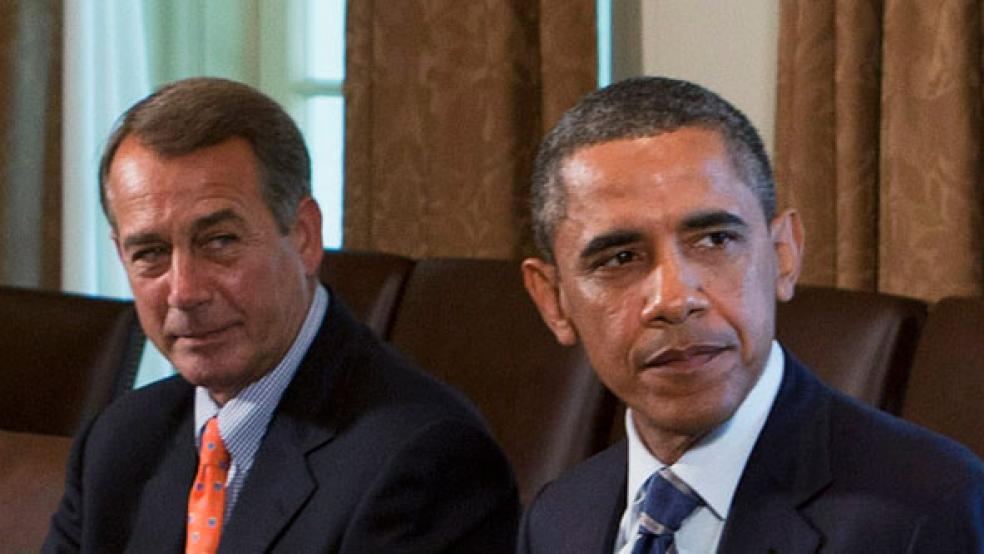House Speaker John Boehner, R-Ohio, put on his game face for the next round of budget negotiations with President Obama over the weekend, offering reporters a bleaker assessment of prospects for a deal than he gave only a day earlier.
With talks over a major package of spending cuts, entitlement reforms and tax increases at a delicate juncture, public pronouncements by the two sides may bear little resemblance to the secret negotiations taking place among administration and congressional staffers and aides in preparation for Sunday’s meeting at the White House.
“There is no agreement in private or in public,” Boehner said at a news conference Friday morning. “It’s not like there is some imminent deal about to happen. There are serious disagreements about how to deal with this very serious problem.”
Boehner underscored the difficulty that both sides will have in selling any “big deal” to solve long term debt problems to their troops. Republicans have consistently said they would not accept an increase in tax revenues as part of an overall plan, and yet some of their leaders reportedly have discussed as much as $1 trillion in fresh tax revenue over the coming decade as part of an agreement. Moderate and liberal Democrats adamantly oppose cuts in Social Security benefits or a significant change in Medicare spending, and yet both of those idea are on the bargaining table. “This is a Rubik’s cube we haven’t quite worked out yet,” he said. “I don’t think this problem has narrowed at all in the last several days.”
Obama was more upbeat this morning, noting, “We had a good meeting here yesterday with leaders of both parties in Congress. And while real differences remain, we agreed to work through the weekend and meet back here on Sunday. The sooner we get this done, the sooner the markets know that the debt limit ceiling will have been raised and that we have a serious plan to deal with our debt and deficit.”
Intense Talks Before Deadline
The White House and Republican and Democratic congressional leaders are locked in intense talks over a plan to reduce the deficit by as much as $4 trillion over the next decade as a prelude to raising the debt ceiling by an August 2 deadline to avert a first-ever default on U.S. debt and obligations. Treasury Secretary Timothy Geithner and Federal Board Chairman Ben Bernanke have repeatedly warned that a default would trigger an international financial crisis that would further undermine the anemic U.S. recovery.
Alan S. Blinder, a Princeton University economics professor and a former vice chairman of the Federal Reserve’s Board of Governors, testified on Capitol Hill Thursday that if the Treasury exhausts its borrowing authority next month, government spending will have to be cut by 40 percent practically overnight, financial markets will panic and tank, interest rates will rise, and the dollar will almost certainly fall.
“The nation has enough troubles with slow growth, with firms’ unwillingness to hire workers, with moribund housing and commercial real estate markets, with government spending falling anyway, and with a Federal Reserve that is out of ammunition. Why, at a moment like this, would we want to shoot ourselves in the foot?” Blinder told the House Democratic Steering and Policy Committee.
Both parties, meanwhile, are using the bleak June unemployment numbers released Friday by the Bureau of Labor Statistics as further argument about what they want out of a deficit reduction deal. Republicans insist that now is the worst time to raise taxes and say that there isn’t enough support in the House to pass a bill.
“Look at these jobs numbers,” House Majority Leader Eric Cantor, R-Va., told reporters Friday. “I’d ask the other side today, do you think now is the good time to raise taxes on small businesses and working families?They’ve got to be kidding if they think now is the time to raise taxes. I’m hopeful that on Sunday we can all get together and realize that you can’t raise taxes.”
Democrats continue to argue that cutting spending in a fragile economy is not the answer to jumpstart job creation. “Today’s news also reminds us that we need to reduce the deficit in a way that will not dampen job creation,” Senate Majority Leader Harry Reid, D-N.V., said in a statement. “That means taking a balanced approach in which millionaires and billionaires contribute to deficit reduction.”
“No doubt there will be more twists and turns before any deal is actually voted on by Congress,” said Paul Ashworth, economist with Capital Economics. “This is, after all, supposed to be political theatre. Politicians on both sides are looking to improve their public images ahead of next year’s presidential and congressional elections.”
Read more on the debt ceiling from The Fiscal Times:
Obama’s Debt Ceiling Proposal Sparks Liberal Fury
Obama May Have to Break the Law if Debt Talks Collapse
Interest Groups Gear up to Fight Cuts, Defend Tax Breaks






